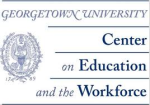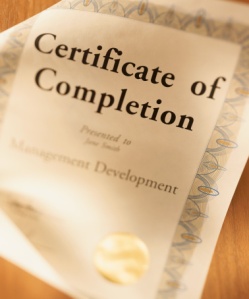When we talk about postsecondary education today, we mean more than degree programs. Serious, rigorous, academic postsecondary certificate programs play a big role and are only recently receiving the attention they deserve.
Recent reports and press coverage that address the value of certificate programs reflect this new interest. For example:
![]() Op-ed piece in Politico by the heads of the Georgetown University Center on Education and the Workforce and the Lumina Foundation.
Op-ed piece in Politico by the heads of the Georgetown University Center on Education and the Workforce and the Lumina Foundation.
![]() Short piece in the Chronicle of Higher Education reporting the rise of certificate programs to 22% of postsecondary credentials awarded.
Short piece in the Chronicle of Higher Education reporting the rise of certificate programs to 22% of postsecondary credentials awarded.
 A report the Georgetown University Center on Education and the Workforce about the value of certificates.
A report the Georgetown University Center on Education and the Workforce about the value of certificates.
Certificate programs are appropriate for nearly everyone at all stages of the career span:
- A recent high school graduate seeking to enter the job market
- A new college graduate who wants to add practical and applied learning to his/her new BA degree
- Working professionals who want to refresh their knowledge and progress in their careers
- Adults who want to transition to a new career
Certificates are a great stepping stone to a degree. (A new report documents this.) Many universities accept credit earned in certificate programs toward degree completion.
We have conducted our own research here at UCLA on hiring managers’ perceptions of postsecondary certificate programs. Earlier this year, we held a series of focus groups spanning a number of industry sectors. We learned that hiring managers . . .
- View certificate programs favorably when listed on an applicant’s resume in addition to a relevant degree and experience
- Consider the reputation of the certificate program provider as part of the value of the certificate
- Acknowledge many disciplines (e.g., information systems, programming, accounting) have well recognized industry specific certificate programs
- Believe completion of a certificate program indicates an applicant’s willingness to stay current in the field, or as one manager said, “a person who will go the extra mile”
But not all certificates are created equal. The hiring managers who participated in our study acknowledged that one can receive a “certificate” from sitting through a one day seminar. It’s important that we begin to specify what we mean by a full certificate program. Characteristics of quality programs include:
- Rigorous curriculum designed with advice from industry experts
- Reputable provider (university-based certificate programs are considered highly reputable)
- Sufficient length of time (e.g., multiple courses over a span of 1-2 years of part-time study)
- Practical, relevant, and current knowledge
- Taught by university faculty or adjunct faculty with a great deal of professional experience
- Link to an industry or professional organization for additional endorsement
- Outcome measures to document student learning (exams, projects, grades, transcripts)
- Academic credit that may be applied to future degree programs
I am happy the current conversation about certificate programs is yielding questions that will lead us to better definitions and understandings. I always have believed in the value of rigorous certificate programs. (Indeed, UCLA Extension rewards an average of 2,000 such certificate per year.) I am glad the rest of the world is catching on.


Pingback: Value of Certificates by Dean Cathy Sandeen | InsideTrack Higher Education Blog :: InsideTrack